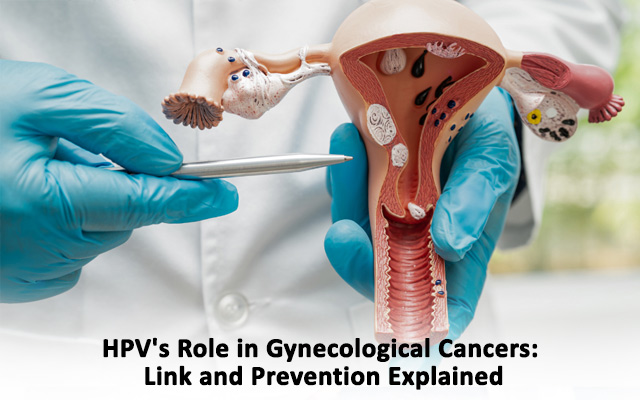Human papillomavirus (HPV) is a group of viruses, that spreads through sexual contact. These play a significant role in gynecological cancer causes. While some types of HPV are harmless, others can lead to serious health risks, thus HPV is categorized into low-risk and high-risk types. Recognizing the symptoms and adopting preventive measures can help protect your health. In this blog, we will discuss the link between HPV and gynecological cancer.
Signs of HPV-Related Gynecological Cancers
Although not every HPV infection leads to cancer, it’s crucial to be aware of the warning signs associated with gynecological cancer causes. Common symptoms include:
- Abnormal Vaginal Bleeding: This may occur between periods, after intercourse, or after menopause, which could be an indication of underlying cancer.
- Unusual Vaginal Discharge: Changes in colour, odour, or blood-stained discharge especially in a postmenopausal woman.
- Pelvic Pain: Ongoing pelvic pain or back pain without a clear cause can be a symptom of gynecological cancers.
- Leg Swelling: This may occur when a tumor presses on lymph nodes or blood vessels.
- Weight Loss and Fatigue: Unexplained weight loss and continuous fatigue.
- Non-healing sore in the vulva: Any non-healing sore needs further investigation with a biopsy to rule out cancer, especially in the elderly.
Addressing these symptoms promptly can significantly improve treatment outcomes and reduce the impact of gynecological cancer causes.
Prevention Tips
Preventing HPV and reducing the risk of gynecological cancer causes requires a proactive approach. Here are a few key preventive measures:
- Practice Safe Sex: Using condoms during intercourse lowers the risk of HPV transmission. Although condoms are not 100% effective, they significantly reduce the chances of contracting HPV.
- HPV Vaccination: One of the most effective ways to prevent HPV-related cancers is through vaccination. The HPV vaccine provides protection against high-risk strains that are major gynecological cancer causes.
- Regular Pap Smears and Pelvic Exams: Routine Pap smears help detect precancerous changes in the cervix, enabling early treatment. Regular pelvic exams are also vital for monitoring overall gynecological health.
Conclusion
HPV is linked with various gynecological cancer causes, but understanding the signs and adopting preventive measures can help reduce the risk. By practicing safe sex, getting vaccinated, and scheduling regular screenings, you will be able to minimize your chances of developing HPV-related cancers.
Consult the best gynecological cancer doctor in Salt Lake, Kolkata to learn about the potential risk and prevention tips.


